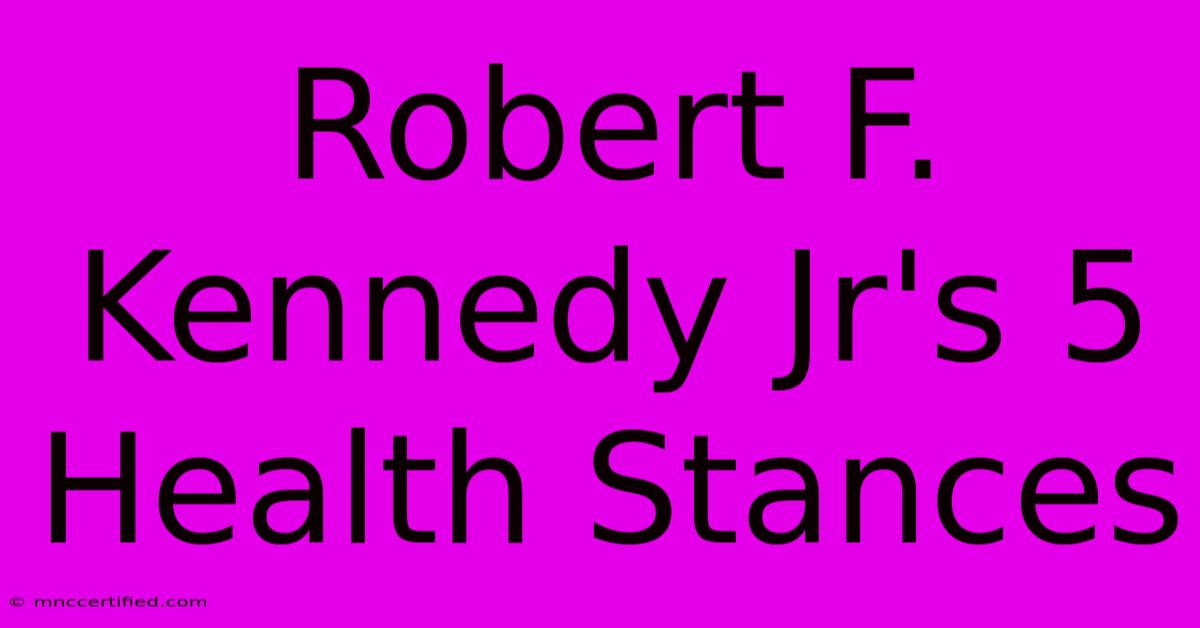Robert F. Kennedy Jr's 5 Health Stances

Table of Contents
Robert F. Kennedy Jr.'s 5 Controversial Health Stances: A Deep Dive
Robert F. Kennedy Jr., a prominent environmental lawyer and anti-vaccine activist, holds several controversial stances on health issues. While he enjoys a significant following, his views often clash with mainstream scientific consensus. Understanding his positions is crucial for navigating the complex landscape of public health debates. This article delves into five of Kennedy Jr.'s most debated health stances, presenting both his arguments and the counterarguments from the scientific community.
1. Vaccine Safety and Efficacy: A Skeptical Perspective
Kennedy Jr.'s most widely known position is his skepticism regarding vaccine safety and efficacy. He's a vocal proponent of the claim that vaccines cause autism and other developmental disorders, a claim repeatedly debunked by extensive scientific research. He advocates for more research into potential vaccine side effects and promotes a slower, more cautious approach to vaccination schedules.
Kennedy Jr.'s arguments: Often center around anecdotal evidence, citing individual cases of adverse reactions following vaccination. He also highlights the financial interests of pharmaceutical companies and questions the independence of regulatory bodies.
Counterarguments: The overwhelming scientific consensus, supported by numerous large-scale studies, shows no causal link between vaccines and autism. Organizations like the CDC and WHO have consistently affirmed the safety and efficacy of vaccines, emphasizing their crucial role in preventing numerous life-threatening diseases. The benefits of vaccination far outweigh the extremely rare risks of adverse reactions.
2. Mercury in Vaccines: A Persistent Concern
Kennedy Jr. focuses heavily on the historical use of thimerosal, a mercury-containing preservative, in vaccines. While thimerosal has been largely removed from most childhood vaccines in the US, he continues to argue that even trace amounts pose significant health risks.
Kennedy Jr.'s arguments: He points to studies suggesting potential links between mercury exposure and neurological problems. He emphasizes the precautionary principle, arguing that the potential risks, however small, warrant removing mercury entirely.
Counterarguments: Numerous studies have shown that the levels of mercury in vaccines that contained thimerosal were not high enough to cause harm. The removal of thimerosal from most vaccines was a precautionary measure, not an admission of guilt. The scientific community emphasizes the importance of context and dose when assessing the toxicity of substances.
3. Environmental Toxins and Their Impact on Health
Kennedy Jr. is a strong advocate for environmental protection and believes that exposure to environmental toxins plays a significant role in various health problems, including autoimmune diseases and cancer.
Kennedy Jr.'s arguments: He highlights the pervasive nature of environmental pollutants, such as pesticides and industrial chemicals, and argues that their cumulative effects are largely underestimated. He advocates for stricter regulations and a shift towards more sustainable practices.
Counterarguments: While the impact of environmental toxins on health is acknowledged, the specific causal links and the extent of their impact are often complex and require further investigation. Attributing specific health issues solely to environmental factors without considering genetic predisposition and lifestyle choices can be misleading.
4. The Importance of Holistic and Integrative Medicine
Kennedy Jr. promotes the use of holistic and integrative medicine approaches, advocating for a more patient-centered approach to healthcare that considers the whole person, not just the disease.
Kennedy Jr.'s arguments: He emphasizes the benefits of alternative therapies, such as nutritional interventions and lifestyle changes, in conjunction with conventional medicine. He believes that a holistic approach can lead to better health outcomes and reduced reliance on pharmaceuticals.
Counterarguments: While some complementary therapies can be beneficial, it's crucial to ensure their safety and efficacy through rigorous scientific testing. Relying solely on alternative treatments without proper medical supervision can be risky, especially for serious health conditions.
5. Critique of the Pharmaceutical Industry and Government Regulation
Kennedy Jr. is a vocal critic of the pharmaceutical industry and government regulatory agencies, alleging conflicts of interest and a lack of transparency.
Kennedy Jr.'s arguments: He points to the financial incentives that drive drug development and marketing and questions the independence of regulatory bodies like the FDA. He argues that these factors influence the approval and promotion of potentially harmful drugs while suppressing information about safer alternatives.
Counterarguments: Regulatory agencies like the FDA have rigorous processes for drug approval, designed to ensure safety and efficacy. While conflicts of interest are a possibility in any industry, robust regulatory frameworks aim to mitigate these risks. Criticism of the pharmaceutical industry should be balanced with recognition of the crucial role it plays in developing life-saving medications.
Conclusion:
Robert F. Kennedy Jr.'s views on health issues are complex and controversial. While his advocacy for environmental protection and a more holistic approach to healthcare resonates with many, his skepticism regarding vaccines and his criticisms of mainstream science have generated significant debate. It's essential to critically evaluate his statements, comparing them to the vast body of scientific evidence and the consensus views of leading health organizations. Informed decision-making requires a balanced understanding of all perspectives and a careful consideration of the scientific evidence. Always consult with qualified healthcare professionals for personalized medical advice.

Thank you for visiting our website wich cover about Robert F. Kennedy Jr's 5 Health Stances. We hope the information provided has been useful to you. Feel free to contact us if you have any questions or need further assistance. See you next time and dont miss to bookmark.
Featured Posts
-
Stallone Calls Trump Second George
Nov 16, 2024
-
Stallone Trump A Second Washington
Nov 16, 2024
-
Uefa Nations League When Is Portugal Vs Poland
Nov 16, 2024
-
Addressing Foreign Bribery In Portugal
Nov 16, 2024
-
Stallone Compares Trump To Washington
Nov 16, 2024